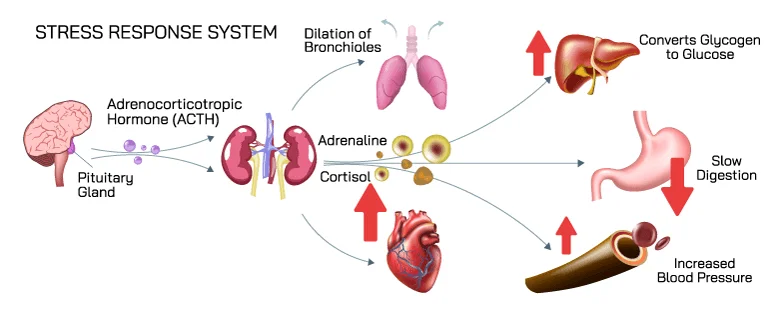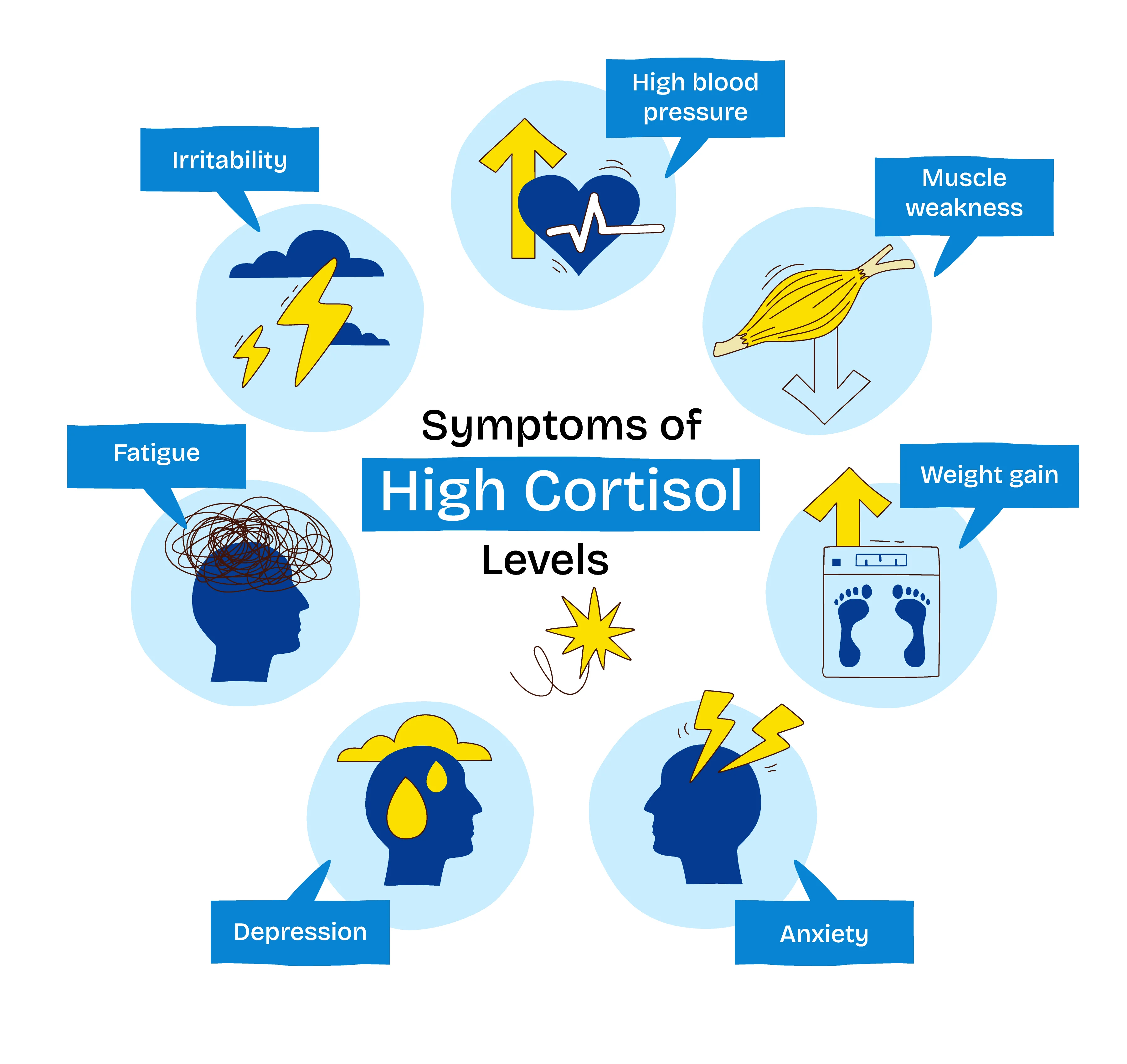Subscribe to get weekly insights
Always stay up to date with our newest articles sent direct to your inbox
Published on 20 Aug, 2025
Updated on 20 Aug, 2025
18 Views
5 min Read

Written by Sejal Singhania
Reviewed by Akhil Pillai
favorite0Like
favoriteBe the First to Like
Have you ever noticed that you're gaining weight without changing your diet, or a racing heart, even at the slightest stress? These could be symptoms of high cortisol levels in females and males. Cortisol, also known as the stress hormone, plays a vital role in many of our body’s functions.
Understanding what cortisol is, how it works, and when to seek medical advice are all helpful steps toward taking care of your health. Keep in mind that if your body is constantly producing too much cortisol, it might be a sign of an underlying health issue. Let’s explore common high cortisol symptoms, how healthcare professionals diagnose them, and some practical ways to manage it.
Cortisol is an important hormone produced by the adrenal glands that helps manage stress, metabolism, blood sugar, and inflammation. However, if cortisol levels stay high for too long, women may experience various physical, emotional, and hormonal health problems. This condition is called hypercortisolism and can cause symptoms such as weight gain, fatigue, anxiety, high blood pressure, and irregular menstrual cycles.
Sustained high cortisol levels can also weaken the immune system, increase the risk of osteoporosis, and lead to heart disease. It is essential to address hypercortisolism through lifestyle changes, stress management techniques, and medical help to avoid long-term health issues and enhance overall well-being.

Yes, cortisol is essential for controlling your body's stress response. This steroid hormone, produced by the adrenals during stress, helps the body cope with the physical response to perceived risks or challenges. Although it is essential for managing anxiety, cortisol is also involved in many other body functions.
Symptoms can differ based on the cause of your elevated cortisol levels or the extent of the increase. When cortisol remains high, the body stays in a state of fight or flight, potentially leading to various issues. In women, high cortisol levels can manifest as a range of physical and emotional symptoms. Common signs and symptoms of high cortisol levels include:

Low cortisol levels, called adrenal insufficiency, manifest with various physical and mental symptoms. When the body doesn't produce enough of this hormone, it leads to a condition called Addison's disease. These symptoms appear slowly, and some of them include:
Different factors can cause cortisol levels that are too high or too low. Let's explore them.
If cortisol levels remain high (a condition known as hypercortisolism) over a long period, it often indicates Cushing syndrome. Various reasons can lead to high cortisol levels, and subsequently, this condition.
Low cortisol levels, known as hypocortisolism or adrenal insufficiency, can occur due to adrenal gland problems or problems with the pituitary gland that regulates cortisol production. Common causes for low cortisol levels include:
>> Also Read: Does My Insurance Cover Therapy?
Here are some natural methods to help balance cortisol levels:
Identifying high cortisol levels involves several steps:
High cortisol levels, commonly linked to Cushing's syndrome or continuous stress, can be managed with different treatments. For Cushing's syndrome, medical and surgical options might be required. Treatments that assist in controlling cortisol levels may consist of:
Bonus Tip: Cortisol imbalance can sometimes be connected to underlying health issues that may require regular check-ups, tests, and treatment. Having good medical coverage ensures you won't have to delay care because of unexpected bills. The best health insurance plans from Care Health Insurance include specialist consultations, diagnostic tests, and hospital bills so that you can focus on your recovery without stress. Remember, a small step today can lead to a much better tomorrow.
Cortisol is a vital hormone that supports your body's functions throughout the day, and it's not inherently harmful. However, abnormal levels, too high or too low, can negatively affect your overall health. High cortisol can have a significant impact on physical health, emotional stability, and reproductive health. Getting an early diagnosis and starting the proper treatment can make a big difference in managing symptoms and avoiding long-term issues. Making some simple lifestyle changes, managing stress, and following your healthcare provider's advice are great ways to keep your cortisol levels in check. Listen to your body—when your stress hormone is balanced, you'll notice you're feeling stronger and more vibrant every day.
Disclaimer: The above information is for reference purposes only. Kindly consult your general physician for verified medical advice. The health insurance benefits are subject to policy terms and conditions. Refer to your policy documents for more information.
favoriteBe the First to Like
शुगर कंट्रोल कैसे करे? जानें, डायबिटीज में क्या खाना चाहिए Vipul Tiwary in Health & Wellness
Thyroid : मामूली नहीं हैं महिलाओं में थायराइड होना, जानें इसके लक्षण और घरेलू उपचार Vipul Tiwary in Diseases
हाई ब्लड प्रेशर को तुरंत कंट्रोल कैसे करें? देखें इसके उपाय Vipul Tiwary in Diseases
प्लेटलेट्स की कमी के लक्षण, कारण और इलाज क्या है Vipul Tiwary in Diseases
7 Hidden Benefits that Make Cayenne Pepper Worth the Hype Jagriti Chakraborty in Health & Wellness
Swollen Legs? It Could Be Chronic Venous Insufficiency Gungun Bhatia in Diseases
Septoplasty or Rhinoplasty: Which is the Best Nose Surgery? Sejal Singhania in Diseases
Is Pregnancy After 35 Safe? Facts About Advanced Maternal Age! Sejal Singhania in Health Insurance Articles